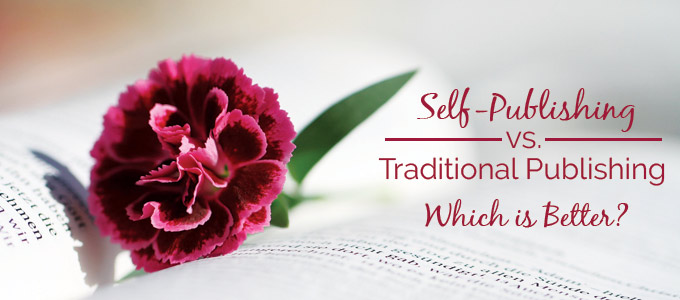As a writer preparing to publish your novel, you are doubtlessly trying to determine which publishing method will bring the most success to your book. Both self-publishing and traditional publishing have their perks and pitfalls. But which will work best for your book? Explore this list of self-publishing vs. traditional publishing pros and cons to find out. But first, remember…
Preparation
Before you approach either method of publishing, get a good editor to review your work. Whether the manuscript will end up in front of a publisher, or go directly to the hands of readers, it must look professional. Otherwise, if your manuscript holds puddles of typos, grammatical errors, or plot holes, either may reject your book. You must have a quality project ready to go for both traditional and self-publishing.
So when it comes to the actual publishing process, which one is better? Let’s compare the two.
Q: Which Method Gives the Author the Most Control?
A: Self-Publishing
When an decide to self-publish a book, they are in complete control of the project. You decide what the cover looks like, what fonts to use, what to put on the blurb, and of course, how the story is told. You keep all rights, and the project turns out just the way you intended.
Traditional publishers, meanwhile, will purchase many of the rights of your book. In most cases, this means the publisher will choose what your book looks like, and even request changes to the manuscript. This rigidity is in place so that the publisher can mold the book into a project they can trust will sell. Though the author can argue their points, the publisher doesn’t have to listen.
Q: Which Method is Less Expensive?
A: Traditional Publishing
While one of the perks of self-publishing is that you are in charge of it all, that’s also one of the downfalls because it also means you are the one in charge of paying for everything, from cover designers, to editors, to distributors. Even purchasing your own hard copy books to sell costs money, and if the book doesn’t do well, that’s money you’ll never make back.
However, traditional publishing doesn’t cost anything before the book is published because agents and publishers do not require upfront fees. Instead, they’ll take a percentage of the book’s royalty once it’s selling. And, all the while, the publisher is paying their team to design, edit, and promote your book. Additionally, most publishers will provide an advance when they sign a book. While the advance is comprised of the money the author is expected to earn while selling their book, that isn’t money they have to pay back if the book doesn’t sell as well as expected. Additionally, once that quota is met, the author begins to make more money via their royalties.
Though it’s true that an author who self-publishes makes more off of each book they sell (60%-80%) than those who traditionally publish (earning 15%-20% royalties), the money the traditionally published author earns is pure green, while those the self-published author earns must be balanced against the cost of publishing the book in the first place.
Q: Which Method is Faster?
A: Self-Publishing
Though the time it takes to publish a book can vary, in most cases the decision to self-publish will mean the book is put into production faster. In traditional publishing, the time it takes to get an agent, editor, publisher, and polish the manuscript into its most salable product will add months or even years to the publication date. If your manuscript has a niche audience that talks about subjects that are important right now, self-publishing may be the best method for you.
Q: Which has better Marketing?
A: Traditional Publishing
Both traditional and self-publishing require the author to do their own extensive marketing, but traditional publishing can open doors that most authors, even through self marketing, can’t access on their own. At its most basic, a publishing house should be providing access to trade reviewers, seasonal catalogs, and book stores. On a more advanced level, publishing houses may provide advertisements in well-known magazines, or schedule interviews and book signings. Though a self-publishing author can access some of these things on a local basis, it can be difficult to access prestigious locations and national markets without a publisher providing a recommendation.
Which Method is More Successful?
A: Both
There are many examples of self-publishing authors who made it big on their own, or traditionally published author’s whose books flopped completely. There is risk involved in both ventures. Likewise, either method can earn great success. Whether or not your book is successful will depend on you, not the method of publication.
Still having a hard time deciding whether you want to be traditionally published, or go independent? Ask yourself these questions.
Ready to self-publish, and looking for a printer? Alexander’s is a digital print shop that can provide you with the quantity of books you need when you need it. Contact us in the form below, and we’ll help get your book in your hands.



There are pros and cons to each. It’s important to spend time carefully analyzing each option. If possible, speak with other authors that have gone in either direction to get a better sense of which might be the best fit for you.